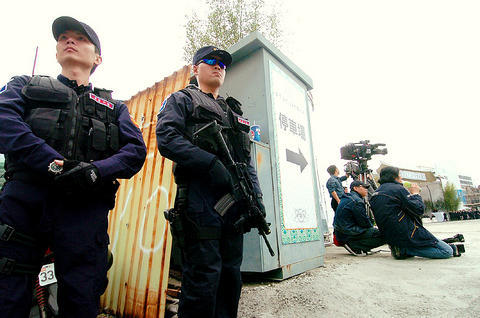More than 1,000 police officers were yesterday stationed at the temporary funeral hall for former Bamboo Union gang leader Chen Chi-li (
Chen, who turned the Bamboo Union into one of Taiwan's largest gangs, died of pancreatic cancer in Hong Kong on Oct. 4. He was 64. His body was delivered back to Taiwan from Hong Kong yesterday and arrived at the temporary funeral services site around 2pm.
In addition to the police officers, at least another 500 people, including Bamboo Union members, Chen's friends and family members gathered at the shrine to greet Chen's casket.

PHOTO: CHIEN JUNG-FONG, TAIPEI TIMES
Local television broadcast live coverage of the plane carrying Chen's body, with his family, friends and some 100 reported gang members landing at around noon.
"We want to make sure that gang members do not take advantage of the opportunity to promote gang activity or recruit new members," said Kao Cheng-sheng (高政昇), deputy commissioner for the Criminal Investigation Bureau.
Wu Dun (吳敦), a former Bamboo Union member and a good friend of Chen's, said that the final date for Chen's funeral service has yet to be decided, but should be sometime early next month.
The Bamboo Union was established in 1957.
For decades the gang remained Taiwan's most powerful gang, comprising mainly people who fled China's civil war in 1949. It later backed the Chinese Nationalist Party (KMT) government in their suppression of political dissidents.
Chen, wanted in Taiwan for organized crime, had been living in self-imposed exile in Cambodia since 1996. In August he was hospitalized in Hong Kong after his health declined.
The gang boss is best known for his involvement in the October 1984 shooting death of an author of an unflattering biography of president Chiang Ching-kuo.
Chen and several fellow gang members flew to San Francisco and gunned down Taiwanese-American writer Henry Liu (劉宜良), better known by his pen-name Jiang Nan (江南), at his home in the suburb of Daly City.
Liu's widow, Tsui Ron-chi (
"Chen Chi-li was sacrificed for our patriotic struggle," she said. "The murder gave Taiwanese dissidents an unprecedented chance" to win over support for their democratic campaign," she said.
Chen was nabbed in Taiwan one month later during a crackdown on organized crime.
At the trial, he said that the murder was ordered by a Taiwanese intelligence unit chief who claimed Liu spied for Taiwan, China and the US.
Chen and an accomplice in the killing were both sentenced to life in prison after Taiwan rejected a US demand to extradite the two for trial there.
Chen served six years in a Taiwanese jail before being paroled. Three senior intelligence officials were also jailed.
He later fled to Cambodia during another government crackdown on organized crime.
Chen is survived by his wife Chen Yi-fan (

Alain Robert, known as the "French Spider-Man," praised Alex Honnold as exceptionally well-prepared after the US climber completed a free solo ascent of Taipei 101 yesterday. Robert said Honnold's ascent of the 508m-tall skyscraper in just more than one-and-a-half hours without using safety ropes or equipment was a remarkable achievement. "This is my life," he said in an interview conducted in French, adding that he liked the feeling of being "on the edge of danger." The 63-year-old Frenchman climbed Taipei 101 using ropes in December 2004, taking about four hours to reach the top. On a one-to-10 scale of difficulty, Robert said Taipei 101

Nipah virus infection is to be officially listed as a category 5 notifiable infectious disease in Taiwan in March, while clinical treatment guidelines are being formulated, the Centers for Disease Control (CDC) said yesterday. With Nipah infections being reported in other countries and considering its relatively high fatality rate, the centers on Jan. 16 announced that it would be listed as a notifiable infectious disease to bolster the nation’s systematic early warning system and increase public awareness, the CDC said. Bangladesh reported four fatal cases last year in separate districts, with three linked to raw date palm sap consumption, CDC Epidemic Intelligence

Taiwanese and US defense groups are collaborating to introduce deployable, semi-autonomous manufacturing systems for drones and components in a boost to the nation’s supply chain resilience. Taiwan’s G-Tech Optroelectronics Corp subsidiary GTOC and the US’ Aerkomm Inc on Friday announced an agreement with fellow US-based Firestorm Lab to adopt the latter’s xCell, a technology featuring 3D printers fitted in 6.1m container units. The systems enable aerial platforms and parts to be produced in high volumes from dispersed nodes capable of rapid redeployment, to minimize the risk of enemy strikes and to meet field requirements, they said. Firestorm chief technology officer Ian Muceus said

MORE FALL: An investigation into one of Xi’s key cronies, part of a broader ‘anti-corruption’ drive, indicates that he might have a deep distrust in the military, an expert said China’s latest military purge underscores systemic risks in its shift from collective leadership to sole rule under Chinese President Xi Jinping (習近平), and could disrupt its chain of command and military capabilities, a national security official said yesterday. If decisionmaking within the Chinese Communist Party has become “irrational” under one-man rule, the Taiwan Strait and the regional situation must be approached with extreme caution, given unforeseen risks, they added. The anonymous official made the remarks as China’s Central Military Commission Vice Chairman Zhang Youxia (張又俠) and Joint Staff Department Chief of Staff Liu Zhenli (劉振立) were reportedly being investigated for suspected “serious